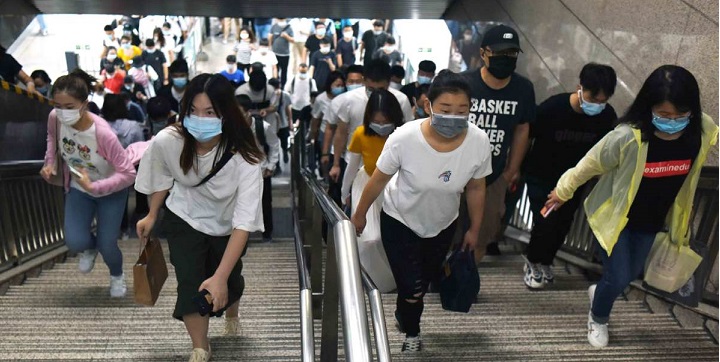
The rise of the modern state carried along many unsolved ambiguities rooted in the foundations of western political thought. It also creates opacities for the transformation of the Chinese state on the eve of the 20th Party Congress in the fall. Beijing needs to understand its situation to deal with it.
Between the mid-1800s and mid-2000s, there was a significant transformation in the structure of the western state and the economy while also gaining greater control of the global economy[1]. The feudal state became “modern” and liberal, and several areas became prohibited or were monopolized by the state.
For example, violence that was once also private—people carried weapons without special permission or had private militias—became the state’s monopoly.
Activities such as slavery and drug trafficking, previously perfectly legal, were prohibited; prostitution and gambling became heavily regulated. The state then took on many powers to protect law and order previously legally distributed throughout the territory, with the payment of “paramilitaries” of influential locals.
But this encroachment of the state on feudal inheritances or activities that were previously “free trade” did not eliminate private violence or drug trafficking. It only made them illegal and, therefore, clandestine, secret. So, these activities went on a small scale or organized, since they are business areas, into industries unlike theft and swindling, which are occasional activities.
Another element, secret societies or clubs, and illegal associations became legal and therefore subject to regulations because they were against the constituted powers. In some cases, however, some associations remained, or became illegal in order to practice economic activities that have become illegal, such as slavery or drug trafficking or the collection of protection money by “mafias.” [2]
They take on tasks, actual or alleged, of administering a local peace and civil or criminal justice in place of the state where the state is lacking or pushed out.
Since these are for-profit organizations and not for political purposes when an illegal or semi-legal industry is practiced, they must be secret and need conscious or unconscious protection by state bodies. That is, protection from the central state covering “mafias” for its own purposes or unconscious because state officials are corrupt.
This creates gray areas of semi-legality for the state, which leads to ambiguities for citizens and also to gray areas of the powers of the state because clandestine for-profit organizations can begin to have their own political agendas, alternative to that of the state.
Western states, coming from this situation, decided to deal with organized crime ad hoc, by recognizing that crime, organized or not, coexists with a free society and society needs to keep an eye on and purge it. But it can’t be eradicated.
The confusion is due to many historical reasons and the succession of systems of different origins. But it is also due to complex debates that come from antiquity, and as early as the 5th century BC, saw differences in political regimes that could alternate within the same country: democracy (government of the plebs, really), oligarchy, kingdom, dictatorship, and many things in between.
The complexity and ambiguity also turn into a difficulty in maintaining order and prompt a country like China with a very linear idea of the state to reject this political proposal altogether.
Chinese order and modernity
In the ancient Chinese tradition, everything was highly regulated, and there was no debate between forms of government. Society was divided into the gentlemen and common people, who were treated differently by the state. There were xing (corporal punishments) for the commoners, and for the aristocrats, there were li (ritual regulations) according to the 4th century BC Liji, the Classic of the Rituals. But both are strongly regulated.
In the forms of government, we have only one indicator of a political debate, whether the heir to the throne was to be a natural son or an adopted son, chosen by the ruler without thought of his origins[3].
There were also differing schools of thought on whether rules were to be enforced forcefully (legalists) or tactfully and humanely (Confucians). There was, in any event, an agreement that the rule was based on a Mandate from Heaven (Tian ming), which could be changed if the people were poorly ruled.
From 1949 to the present, there was a massive transformation in how the Chinese state was administered. For centuries, China’s state apparatus had been relatively light, relying on powerful local clan leaders who administered the place with the agreement of the imperial official. Conversely, beginning with the People’s Republic of China, central authority descended to the lowest village levels, eliminating clan chiefs.
This was an unprecedented shift in China, achieved through a massive overhaul of the traditional society, which was considered guilty of China’s humiliation in the century before. And yet it was not the last big shift; other changes came just about 30 years later.
With economic liberalization, in the late 1970s, the deep, rigid structure of the People’s Republic of China (PRC) was undermined without being adapted. There was only decay of old power and penetration of new powers without a new clear political and legal framework. New economic activities grew in a gray area without a clear legal distinction between what was legal or illegal. Into this grew activities elsewhere considered legitimate or that the world considered mafia-like.
In this way, in the late 1990s the Chinese state felt it was being undermined by mafias, which were homegrown or “transplanted from Hong Kong and Taiwan. Still, by the early 2000s, China had eliminated mafias. Still, so many protection activities and abuses of power were de facto “taken over” directly by state elements, which became highly corrupt.
The response to all of this was to try to eradicate the problem, not like in the western countries to accept the existence of crime that had to be kept under control but could not possibly be wiped out. The mindset was similar to the one at the early stage of the PRC, imposing an important mutation of the state system, while holding however the same 1949 ideological mold.
In this context, President Xi Jinping’s concentration of power may be historically equivalent to the reforms of Louis XIV in France in the 17th century to fight off the feudal power of the aristocracy. But after the first concentration, power must be redistributed differently because it is simply impossible to manage a large and challenging country with one man.
Moreover, while in the West this slow mutation occurred over 3-4 centuries and it was in one direction from feudal to liberal society, although, with many bumps in the road, with fascist and communist revolutions in the meantime. China was different. China went over a rollercoaster of colossal vagaries over just some 70 years. They might have been all right, but no society can go through these frequent ups and downs without being profoundly shaken and hurt.
The US turn
In the meantime, there was not only that. Something confusing was happening in America, for decades the beacon of China’s modernization.
The USA was the first genuinely modern state before the liberal revolution involved Europe. Thus, being ahead of its time, perhaps leads to the fact that the US retains ancient vestiges: too widespread carrying of arms; private violence not totally monopolized by the state; a cumbersome electoral system; a legacy of the former slavery system not yet fully digested.
The abolition of slavery was, in modern terms, a most profound economic transformation in the USA. The emancipation of slaves meant that trillions of dollars in value (in modern money) of the slaves themselves were wiped out, and an entire production system was undone.
In this way, trillions of dollars of value were forced out of the South to the North, a “depredation” of wealth in the name of liberty. Of course, it was right, but it left ex-slavers in the South impoverished and without a clear future. This was done in other countries, too, but ex-slavers arguments were excluded from the political debate.
Conversely, in America, shortly after the war, in the 1870s, the ex-slavers and their votes were re-admitted to national political debate. Some of their claims were accepted, thus leading to the de facto partial exclusion of ex-slaves from mainstream political life for many decades, despite being formally free and allowed to vote and been elected. That is, the USA, since the late 19th century, lived through a system made of many spoken and unspoken rules, with differences between states of the Union and local conditions.
It was different from the South African apartheid system. There, Black people were not slaves or valuable property; they were people who participated in economic life, producing value and paying taxes, although they did not vote. Giving them a vote did not take a penny of value away from anyone. Moreover, original African were the majority, unlike in the USA, where ex-slaves were a minority and thus more easily dismissible.
The American difficulties in handling its past and its legacy have an essential bearing on its role and influence in the world, especially compared to European countries, with similar history but different handling of the history of slavery or the right to bear arms. But all of this happens in the open, under the attentive scrutiny of the free domestic and foreign press.
China in and out of the international order
China is globally important. Then the organization of power in China is as global a matter as the US president is. Even if other countries do not vote to elect the president, they actively participate in following the campaign and favor this or that candidate while also playing a role in American public opinion. For example, President Joseph Biden is liked in Europe while President Donald Trump is disliked and has its weight in the US political debate. The US relationship with Europe, the roots of its culture, is not straightforward and untroubled. The unsolved legacy of slavery and its “right to bear arms” is an important and defining issue in America and the US relationship with the rest of the world and Europe.
It’s impossible to think that China – which can intentionally influence the world, trying to pull strings in other countries’ politics, or unintentionally by its sheer global political and economic heft – would not allow the world to peek or see its domestic politics. But this is what Beijing is doing, by heavily censoring the foreign press and foreigners’ movement in China. This objectively creates massive friction between China and the rest of the world.
Beyond that, this friction is clearly visible also elsewhere. The US provides the infrastructure of world trade with its stock market and its dollar.[4] If China wants to challenge this and wants to have an international currency, it needs to have a fully convertible RMB and run a trade deficit to export its own currency. Is China’s financial system ready? And is the political system aware of the costs of all of this? If not, sooner or later, its domestic production is going to take a hit, or it will remain confined to being an important but ultimately disposable part of a complex value chain fully dominated by others.
In this China needs to choose what it wants to be. In a nutshell: Does it want to be an important part of the global system? Then it needs to accept its rules, which means also modifying its domestic system to meet foreign requirements. Does it want to retain its differences from the “foreign system”? Then it will have to accept it will be gradually marginalized and excluded by the “global environment”. This, at the end of the day is the gist of the recent speech[5] on China by US secretary of state Anthony Blinken.
Blinken didn’t try to take China by surprise, threatening it with storm and fury in order to extract quick returns, as the previous Trump administration did. Rather, he laid the foundations for a global consensus of a new world order which would rule China out of it. It is a long-term strategy that doesn’t seek fast concessions or negotiations with China. No surprises, here, just bare “contractual terms”. It says: this is the situation, take it or leave it, it’s up to you. It’s fairer and colder than in the past. It is a historical new ball game that Beijing will have to understand fully; however, it wants to deal with it.
Here the war in Ukraine with the miserable Russian political, military, and economic failures and the ongoing Chinese troubles with COVID could be a blessing in disguise – a healthy warning to Beijing to dispel delusions about the global situation and its path for the future. The time for third ways is gone.
[1] See also John Dickie The Craft – How the Freemasons Made the Modern World 2020.
[2] I’m grateful to Le Monde to have brought up this very sensible and delicate issue. https://www.lemonde.fr/international/article/2022/05/21/pourquoi-la-mafia-est-une-entreprise-comme-les-autres-ou-presque_6127086_3210.html
[3] See Sarah Allan (2015), Buried Ideas: Legends of Abdication and Ideal Government in Recently Discovered Early Chinese Bamboo-slip Manuscripts,
[4] See also Paul Krugman https://www.nytimes.com/2022/05/19/opinion/putin-russia-sanctions-ukraine.html
[5] https://www.politico.com/news/2022/05/26/blinken-biden-china-policy-speech-00035385





